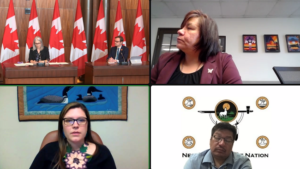‘Class action lawsuits should not be needed for basic rights to be recognized,’ stresses Chief Emily Whetung

By Rick Garrick
OTTAWA — Curve Lake Gimaa Kwe Emily Whetung stressed that class action lawsuits should not be needed for basic rights to be recognized during the April 28 opening of the First Nations Drinking Water Settlement claims period. Neskantaga Chief Wayne Moonias, Tataskweyak Cree Chief Doreen Spence, and Indigenous Services Minister Patty Hajdu also provided updates and remarks during the announcement of the claims period, which is open until March 7, 2023.
“My hope is that from here communities like Neskantaga, Tataskweyak, and Curve Lake have access to those necessities of life that we need to build communities and quality of living that resembles the rest of the majority of Canada, given that the resources that Canada is built on are the resources of our people,” Gimaa Kwe Whetung says. “So, my hope broadly is we will be able to reach that point where human rights are recognized and Indigenous rights are recognized and we don’t have to go to court to make that happen.”
Curve Lake, Neskantaga, and Tataskweyak initiated national class action lawsuits in 2019 to address drinking water advisories in their communities and other First Nations across the country, which resulted in the First Nations Drinking Water Settlement agreement between the federal government and First Nations and their citizens who were subject to a drinking water advisory that lasted at least one year between Nov. 20, 1995 and June 20, 2021.
“In October of 2019, the amazing council that I work with supported me in bringing our concerns to court in the form of a class action,” Gimaa Kwe Whetung says. “This settlement means that within this decade, parents and caregivers can bathe their children in their homes. This settlement means that additional costs to Indigenous people purchasing water outside of their communities can end. This means a reduction in plastics accumulating in First Nations waste piles and it can stop finally. This settlement means that my babies can live at home when they’re grown, they can build homes in our community, and they can teach their children our language, our beliefs, and have a better start in life than the generations before them.”
Gimaa Kwe Whetung says the settlement agreement contains commitments to deliver the quality and quantity of water that most Canadians take for granted.
“We have reached an agreement with enforceable timelines, with built-in dispute resolution clauses that recognize the importance of our traditions and beliefs, clauses that ensure response times to meet the same urgency of the situation,” she says. “In some ways, it feels this agreement was reached at lightning speed but in reality, it has taken generations of advocacy and I am honoured to be a part of this resolution.”
The settlement agreement includes about $1.5 billion in compensation for individuals deprived of clean drinking water; the creation of a $400 million First Nation Economic and Cultural Restoration Fund; and a renewed commitment to Canada’s Action Plan for the lifting of all long-term drinking water advisories. It also includes the creation of a First Nations Advisory Committee on Safe Drinking Water; support for First Nations to develop their own safe drinking water by-laws and initiatives; a commitment of at least $6 billion to support reliable access to safe drinking water on reserves; and the modernization of Canada’s First Nations drinking water legislation.
“After many years of not having access to the basic necessity of clean drinking water, the day has finally arrived where Canada has made legal commitments to bring clean water home to First Nations across the country,” Chief Spence says. “We welcome Canada’s partnership through this national settlement agreement, which shows that a new era is possible in this country — one where all residents on reserves can enjoy safe and reliable access to clean water.”
Minister Hajdu says the settlement agreement is a significant milestone for First Nations, who have fought for the same access to clean water that other communities across the country have.
“Through this settlement agreement, Canada accepts the role that the government has played in First Nations lack of access to clean drinking water,” Minister Hajdu says. “The settlement acknowledges the significant harm and discrimination that First Nations people have felt and experienced at the hands of the Canadian government. The settlement also ensures however that safeguards are in place so that we can rebuild trust and confidence amongst First Nations in their water supply and in their relationship with the government of Canada.”
Information about the settlement agreement is posted online at: firstnationsdrinkingwater.ca.


